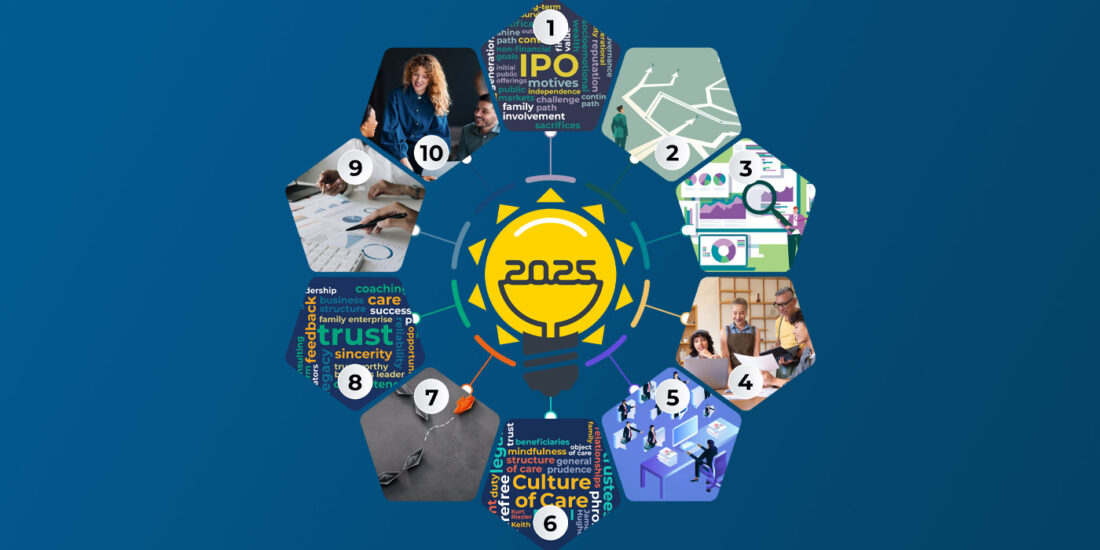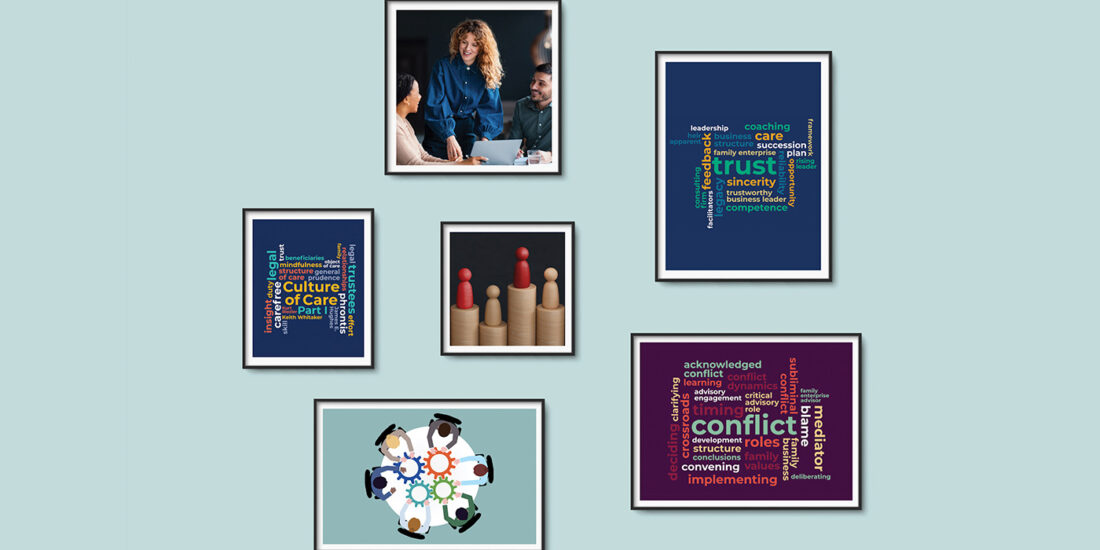While family-owned businesses have existed and evolved for centuries, knowledge of their systemic distinctiveness has a far more recent origin. Research in the field dates from just 25 to 30 years ago, but has since evolved at an exponential rate. Fortunately, this recent origin means that pioneers are still around and able to reflect on the evolution of the field.
In this interview, Ken Moores talks with the co-directors of Northwestern University’s Kellogg Center for Family Enterprises, John Ward and Justin Craig. John was there at the beginning while Justin, a more recent scholar in the field, has been a keen student of the origins of family business thought leadership.
Ken Moores (KM): What were you seeking to achieve with your scholarship in the early days?
John Ward (JW): In the early days I was eager to normalize the challenges of family business success and continuity and to champion the special contributions family businesses bring to our society. I hoped to encourage family business owners to take pride in their “specialness.” My “method” was to listen, make sense, and play back to audiences to test validity. I loved testing ideas by using spontaneous “raise of hands” questions. I also learned a lot by using polling processes to see how various stakeholders and constituents see common issues differently.
KM: When you were an aspiring scholar of family business, what was your impression of the field in those early days?
Justin Craig (JC): Looking back, my impression, and I think it is one that is quite universal now with the benefit of time, is that the field was mainly populated by what I would call ‘blind pioneers’ — people who were not afraid to soldier on despite what others thought of them. I naively joined this band of brothers and sisters and still enjoy looking back over their insights as, perhaps ironically, they have stood the test of time. It certainly was a new frontier, which I thought was curious given that family dynamics and relationships was a mature research pursuit in psychology. It was just that, apart from a few, no one was interested in looking at family in the business context.
KM: Over time how has your research focus changed and developed? What topics have become more important? Have your methods of inquiry changed and, if so, what drove those changes?
JW: Early on I was focused on understanding family businesses from a strategic perspective. How did they do business differently? What were the common challenges they faced? How was all that reflected in their performance, their culture, and their personal visions? I was impressed by how they were driven by values and purpose and how their insecurities and modesty often undermined their creative insights and passion for what they were doing. Once they felt valued, huge transformations took place.
Then I found, thanks to Leon Danco, the power of an independent board of directors and the benefits of public accountability. I really enjoyed the experience of developing and supporting independent boards. The synthesis of board member qualities and particular business needs became magic to me. The board as catalyst teacher, empathic supporter and caring critique brought it all together – from diagnosis to resolution. Hope was well within reach.
The concept of an independent board brought all of governance to the discussion. How do families prepare for conversation, for planning, for unity and commitment of purpose? I believe families with meaningful purpose are thrilling in their impact.
Yes, complexity brings challenges. But thinking about how culture and family size shape family governance (and family and business performance) stimulated more recent thinking. I think the practitioner field has evolved from particular issues, to shared experience, to “best practices” of the successful, to what practices are contextually appropriate.
I love to think of family business as an emotional asset that makes a difference in our world. I see the shift from thinking about the business to the enterprising family as a dynamic portfolio of synergistic opportunities. I’m inspired and fascinated by large, old families and enjoy collecting their stories.
KM: From your early impressions of family business scholarship what topics and issues were you inspired to explore in an effort to establish your reputation?
JC: This is an interesting and timely question. At the time, I was swimming against the tide, so to speak. To get a position in a business school, I needed to position myself as anything but a family business scholar. Perhaps not quite that extreme, but close. So, while there was a ton of topics that I was keen and interested to pursue, it was pointed out to me that these would not likely get published in ‘any decent journal.’ So, I needed to pivot and conform. I always had entrepreneurship as the additional arrow in my quiver, so was able to move my career along in that space. But, I did remain loyal to the emergent family business conversation. My original focus and the topic of my doctoral dissertation was individual behaviour in family firms. At the urging of my supervisor I actually named those who work in family businesses ‘family busineessers,’ which most thought was a typo, and it remains the most interesting description to me. Since joining Kellogg, I have spent a lot of time strategizing how to deliver on that commitment…so, watch this space.
KM: What have been the most influential developments in family business knowledge over the span of your career?
JW: The arena of family enterprise has become a glorious laboratory to debate long-held beliefs and theories of organization. Many have seen this opportunity. They have tested conventional theories and proven new paradigms. It’s only beginning. Family Business Review has made such efforts credible. Happily, we’re now in a positive spiral.
The shift in focus from successful family business to enterprising family is exciting. But we don’t want to forget that family business continuity is still very, very important. Lots of jobs, lots of culture, lots of community involvement are at stake. That’s one reason I’ve become particularly interested in family foundations. That’s where it all comes together, I think.
KM: How would you assess the growth of family business knowledge over the past 25 years?
JW: Simply exponential! For better and for worse, we’ve now reached a point of tremendous specialization of knowledge development. The new challenge is to make that relevant and useful. Before, it was the challenge to make opinion “true.”
KM: The stock of family business knowledge has advanced significantly since you entered the field. In your opinion what have been the most influential ideas to emerge over this time?
JC: Yes, the stock has advanced significantly, and it has been an interesting ride for me as I have watched and been a part of this advancement, even in a small way. You just have to look at the numbers, submissions, special issues in ‘decent journals,’ conference tracks, etc. Reporting those statistics was exciting for a bit but we are all grown up now and more is expected of us as a community. I co-authored a paper for the Family Business Review 25th anniversary edition a few years ago in which we interviewed some luminaries (The Distinctiveness, Design, and Direction of Family Business Research: Insights From Management Luminaries, March 2012, and there were some valuable insights that I would encourage others to look at. The most insightful to me was an observation that ‘good research is good research.’
To your question related to most influential ideas to emerge over this time, I honestly think that the most influential ideas are those that are seminal in different disciplines and which still need to be revisited with our contextual lens. I am not as knowledgeable in this as many others, but I think there is opportunity to go back and revisit what the foundational thinkers had to say and interpret their insights in the business family context.
KM: In terms of future directions what would you consider to be the issues in need of immediate attention and resolution?
JC: I think all indicators are positive. From where I sit, the field seems to be in good hands. Consultants and practitioners are now well informed and have a thirst for knowledge. Importantly, they appreciate the role of scholarship and theory (to make sense of the mess). Doctoral students are exploring interesting research questions. Deans and journal editors ‘get it.’
So, many thanks to those ‘blind pioneers’ who, as it turned out, weren’t so blind after all, and a cadre of naïve zealots who knew no better.
JW: Most urgent attention? I’m not sure. I’d love to see more on how family businesses make a difference in their communities. I’d love to see how those working in family businesses have better homes. I’d love to find how fundamental human – familial – values really define how organizations achieve the best. I’d love to find that business-owning families stay together better and longer.
Conclusion
These reflections highlight that while there has been a shift across time from strategic perspectives to governance-based ones, the emphasis now appears to be on enterprising families seeing their businesses as emotional assets. The extent of new thinking within these areas has grown exponentially over recent years and will challenge advisors to maintain their thought leadership with family clients.
About the contributors
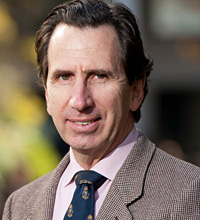 Justin Craig is co-director of the Center for Family Enterprises at Northwestern University’s Kellog School of Management. He served as chair of the 2014 FFI Research & Education Symposium in Washington, DC. Justin can be reached at justin.craig@kellogg.northwestern.edu.
Justin Craig is co-director of the Center for Family Enterprises at Northwestern University’s Kellog School of Management. He served as chair of the 2014 FFI Research & Education Symposium in Washington, DC. Justin can be reached at justin.craig@kellogg.northwestern.edu.
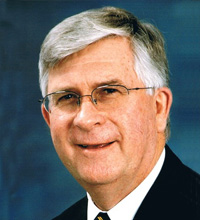 Ken Moores is an FFI Fellow, member of The Practitioner editorial committee and recipient of the 2015 Barbara Hollander Award. He is a principal in Moores Family Enterprise in Australia and an emeritus professor at Bond University. Ken can be reached at ken@mooresfamilyenterprise.com.
Ken Moores is an FFI Fellow, member of The Practitioner editorial committee and recipient of the 2015 Barbara Hollander Award. He is a principal in Moores Family Enterprise in Australia and an emeritus professor at Bond University. Ken can be reached at ken@mooresfamilyenterprise.com.
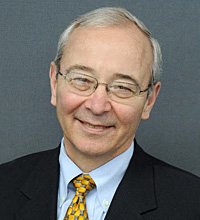 John Ward is clinical professor of family enterprise and co-director of the Center for Family Enterprises at Northwestern University’s Kellogg School of Management. An FFI Fellow, John is also a founding member of FFI and the 1994 recipient of the Richard Beckhard Award. He can be reached at johnward@kellogg.northwestern.edu.
John Ward is clinical professor of family enterprise and co-director of the Center for Family Enterprises at Northwestern University’s Kellogg School of Management. An FFI Fellow, John is also a founding member of FFI and the 1994 recipient of the Richard Beckhard Award. He can be reached at johnward@kellogg.northwestern.edu.



